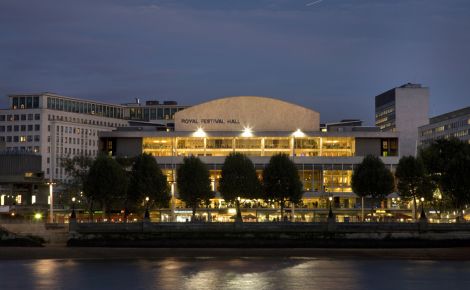Was the Chopin jury not right to eliminate Pogorelich?
mainAn essay for Slipped Disc by the Tchaikovsky Competition silver-medallist, Peter Donohoe, in response to recent negative reviews of the Chopin Competition contestant, Ivo Pogorelich, who was eliminated in the third round.

In 1980 the marketing industry, the critics, the media and thousands of young pianists created an artistically suicidal situation for an obviously highly talented but not yet fully developed pianist. The legendary competition scandal – now having acquired the status of folklore – with its highly public and publicised walk-out by a minority of the err…democratic…jury who disagreed with the majority, catapulted him to international superstardom.The story was seized upon by the anti-competition lobby and used for axe-grinding purposes. Extraordinary amounts of money were made on the back of it, by many more people than the one pianist at the centre. And those qualities of his playing that were perceived by many teachers to have constituted the reason for his massive initial success were used as examples for their students to follow.
The havoc that followed in the piano competition world as a result of the embarrassment created is still being felt nearly 35 years later. As a member of several juries over the last twenty years or so, I have often encountered the elephant in the jury meeting room, and I suspect that the elephant is also present in many competitors’ practise rooms. [Non-British readers may well not have a clue what I am talking about here. Please forgive my silly language – it means that a metaphorical cloud hangs in the form of a collective received memory over the world of piano competitions – is that better? Probably not….]
The desire by some of those who make money out of classical artists to repeat the phenomenon of fame through notoriety has resulted in one sensationally sexy, audacious or immature (or all three) superstar after another; this has been by no means limited to pianists. Almost all of them – but sadly not all – have been extremely talented, but that has rarely been the reason for the hype.
One of the side-effects of such a situation is that many critics and members of the public – plus, I am guessing, many pianists and teachers – flock to hear these superstars when they sniff the possibility of the performances being awful. Thus, the process becomes a cycle – a self-fulfilling prophesy.
Do we see what we have done? We have fallen into the age old trap of putting someone on a pedestal and then shooting them down. The pedestal in this case was one on which only the most balanced, mature and level-headed could stand any chance of survival – even then it would be well-nigh impossible. And then we pilloried him, and continue to do so for pursuing the path we laid for him. By the way, when I use the word ‘we’, I do not mean to include me, or indeed most of you dear readers; I mean the music ‘industry’ as a whole.
The performances Pogorelich gave at the Chopin Competition 35 years ago were by all accounts excellent, although eccentric. His excellence was undoubtedly the cause of a large part of the public’s – and a minority of the jury’s – support. But the eccentricities were possibly the cause of his elimination from the semi-final by the majority verdict, although we will probably never really know what the members of the jury were thinking – and, to an extremely large extent, they formed the element that created his huge international success.
“But so what?” many people will be thinking. “He sells, he is a star, and he gives us something to talk about.”
Well this is ‘so what’: how about we put the music – plus the artists’ long-term heritage and indeed their own artistic survival and development – first? Would it be the right time to begin to think of the performing arts as not being part of the short-term commercial world. Would it be unreasonable to expect the ‘industry’ to stop thinking of artists as performing seals or prototype machines, and their work as ‘product’ – to apply to the arts world slightly different criteria to the one in which you try out a crappy new fast food item by hyping it for a while and seeing if it reels in massive profits, and move on to another if it doesn’t? [Actually I shouldn’t use the word ‘crappy’, because the same principles apply to good new products in shops – however good they are, their continuance seems to depend on nothing more than how many buy them. But typing the word ‘crappy’ does feel good – and it has passed through the spellchecker, so I am not doing a James Rhodes.]
>
If IP had had the chance to take his 1980 elimination in the same way as everyone else has to, and gone on to enter further competitions, perhaps by that time he would have learned not to over-indulge in eccentricities and would have developed musically – and personally – in a different way.Perhaps he would have fulfilled his undertaking to take part in the same Tchaikovsky Competition as I did in 1982; it was, after all, scheduled that he should – two years after the Warsaw debacle – his astoundingly glamorous mugshot plus intended repertoire appeared in the competition booklet, leading to an assumption amongst the more naïve amongst us that we didn’t stand a chance against him.
Perhaps by then he or his teachers would have ironed out his tendency towards eccentricity and he would have gone on to enjoy a longer-term great and more widely respected career – his talent certainly warranted it on the basis of certain YouTube clips from the time (e.g. a performance from Japan of Scriabin’s Etude Op 8 No. 2 which isn’t eccentric at all, and demonstrates what he might have become), and in particular his recordings of Ravel, Prokofiev and Chopin from the early 1980s. It was just that his behaviour was that of a prat, and his musical ideas often narcissistic and divisive; these needed to be knocked out of him before fame froze his immaturity and gave him a permanent complex.
But instead of that, the music lover and record collector was subjected to truck-loads of pop-style publicity based on his eccentricities – not on his superb qualities, but on his spoilt, sulky-child-like personality, his tendency towards musical wilfulness, and his general outrageousness. At the same time, there was general consensus on how good his first recordings were, but let us not imagine for a moment that these constituted the main reason for so much chatter and endless twaddle bilging from the bullshit hydrant that is much of the marketing industry.
Not so long afterwards it became almost fashionable and predictable that he would be trashed both publicly and by a chorus of other pianists bitching, complaining – and telling stories that were undoubtedly subject to Chinese whisper syndrome.
All of this contributed to the cultism that surrounded him, and still does to some extent. The trashings continue, and the eccentricities have grown; large numbers of us seeming to almost enjoy the tearing apart of artists whom others – and sometimes the very same people – put up there in the first place.
That is not to say that the negative reviews over the years have been wrong – I wouldn’t really know about that, as I have not heard IP live more than a handful of times, and in any case it would be inappropriate for me to publicly criticise or otherwise another pianist of my own generation. However, I have heard about those reviews and sometimes read them and the subject is simply tedious beyond measure and it has the built-in characteristic of perpetuating its own irrelevance.
Simply put, he shouldn’t have yet been in a position to receive such a series of sometimes humiliating attacks when he was still a young and developing artist. One or two wonderful recordings and the apparent personality of an outrageous narcissist should not have been enough to have placed him in the precarious position of – for a short time at least – that of the best known pianist of his generation.
Why can we not realise that he is not a Furby? He is not there for the use of the smart-arsed to be prodded, to be made to giggle, howl and cry to amuse us. He is a human being, with obvious complexes that the music world did the opposite of ignoring – instead finding it amusing to capitalise on them and thus provoking him into exaggerating them and indulging them still further.
His performances are reviewed far and wide – I believe I have thus far read nine from his RFH concert alone, and all of them have been negative to the point of humiliation. It shows that we have failed a potentially great artist – many of us have never had the experience of performing on a high level; we fail to grasp the certain fact that, however arrogant or otherwise the artist is, his or her expectations of how the public and the critics are expected to respond will probably directly affect the way they play. If you treat an artist to endless alternation between ridiculous cult-based hype and a regular pillorying, you will quite possibly destroy that artist’s confidence even if he or she is level headed.
Of course I realise that the respective sources of the hype and the reviews are different, but that merely indicates that we tend to respond far too much to hype – in one direction or the other. A minimum of nine reviews for a concert that large numbers expected to be little more than gossip-fodder? Can you imagine how many really excellent but unknown artists pass through London without so much as one? That the media takes the trouble to write so much about an artist whom they mostly collectively despise says it all about the readership – [‘We get the media we deserve’.]
It seems that many felt that his RFH recital was poor – with the exception of his Brahms Paganini Variations. OK. So what if it was? I am sure there were some very fine things about it, and, in any case, every artist does a poor concert sooner or later. Why does it have to plastered all over facebook, the twittersphere, the blogosphere and every other sphere that is now available to the self-important and the opinionated? “Oh my God, did you hear about his simply appalling performance the other night? Tee hee hee! You would not have believed the distortions and the ludicrousness of the tempi! Although of course there were some moments in which you gazed with awe at the colours and all the exquisite shades of pianissimo. But I simply had to leave as soon as possible at the end in case he played an encore. Ho ho ho!” Yes it’s hilarious, isn’t it? Almost as worthwhile reporting via every orifice available that Madonna fell over somewhere.
In other news, the actual winner of the 1980 International Chopin Competition, Dang Thai Son – a superb, although very self-effacing and modest pianist whose talent has been consistently admired by serious music lovers in many countries, but whose name is all but unknown amongst the purveyors of Pogorelich gossip – is now a professor at the Université de Montréal. Almost no one I have spoken to since the offending RFH recital went viral had any memory of who had actually won the 1980 competition – this is particularly telling as I had until nearly two weeks after the event been surrounded by professional musicians and serious students of music, including pianists, at a chamber music festival since the day before the recital. It is despite the fact that Dang’s career has been extremely impressive to those who have followed him, and been genuinely interested in great piano playing, as opposed a temporary victim to an über-marketable product.
>
Could it be that the jury majority decision was right? Has anyone considered that possibility? Under the right circumstances the music world might well by now have had two serious and thoughtful mature pianists on its hands – one whose First Prize was fully valued by the media, and thus respected in turn by the public, and the other who may have emerged as a winner some time later – either in Warsaw or at some other major competition – when he had grown up.
Instead, there is a risk that the latter will join the ranks of other geniuses screwed up by the commercial world and a lack of love for the real person [I am not equating their respective levels of talent, so please don’t jump down my online throat] – yet another phenomenal talent destroyed by the ‘industry’, with its instinct for honing in on the superficial, and disinterest in the long term. If we stopped thinking that for a competition jury to place an artist in any position other than first is to dismiss them as failures, then a potentially great artist being eliminated because of certain aspects of the playing at his earlier stage would not have created a marketable scandal. We need to find enough maturity within ourselves to put a halt to the endless search for novelty.
And, just to be clear: I don’t know about the majority of you, but there is absolutely no doubt in my mind about Pogorelich’s natural ability.
It is just the effect of all the swooning worship, alternating with the vicious condemnation that I find worrying.





Comments